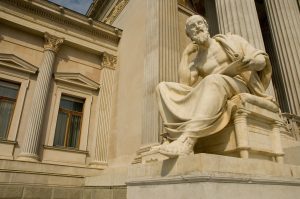Module 2: Historical and Philosophical Foundations of Education in the United States
 Module 2 Outcomes
Module 2 Outcomes
- MLO 2.1: Determine how the evolution of educational philosophies and movements inform current mindsets and practices. (CLO I, InTASC 9n, 10l)
- MLO 2.2: Connect key events, laws, and practices in American educational history to the inclusion or exclusion of students in American educational spaces. (CLO II, InTASC 8s, 9j, 10l)
- MLO 2.3: Analyze how current student demographics inform contemporary decisions about structural changes to K12 education. (CLO II, InTASC 9c)
- MLO 2.4: Assess how personal identities and educational experiences inform educators’ approaches to teaching. (CLO II, InTASC 9m)
Introduction: Philosophical Foundations[1]
“Education is not preparation for life; education is life itself.”
-John Dewey
As a student in a teacher education program, you may have an opinion about what education is and what it should be. You may also have an idea of what teachers do in their roles and what they should do. In the book Schoolteacher: A Sociological Study (1975), Dan Lortie calls this the “apprenticeship of observation” (p. 62). Many people who pursue teaching think they already know what the work entails because they have generally spent at least 13 years observing teachers as they work through their own educational experiences. The role of a teacher can seem simplistic because, as a student, you only see a sliver of what the work entails; however, what you don’t see is the behind-the-scenes work that goes into being a teacher. Your experience as a student can contribute to your understanding of the role of teachers in schools, as well as what the purpose of schooling should be. These ideas typically shape a person’s perspective and teaching philosophy.
In this context, philosophy is the fundamental nature of knowledge, reality, and existence. In the case of education, a person’s philosophy is what they believe to be true about the essentials of education. When considering your philosophy of education, you will want to reflect on your beliefs about the roles of schools, teachers, learners, families, and communities.
This module will introduce you to various philosophies of education. As you go through the first chapter, reflect on your experiences as a student and consider how the philosophies presented align with your teaching preferences. The second chapter provides a deep dive into the history of education by exploring the laws that have helped shape education and the key influencers who advocated for the change.
 Reflect
Reflect
Thinking about Teaching Generally
Before moving into the content of this module, reflect on the following questions, as this activity will help you to start thinking about your teaching philosophy.
- What does being a teacher mean to you?
- What makes a teacher a teacher?
- What content or subjects should be taught?
- How should the content or subjects be taught?
- Why is teaching important?
- What is knowledge?
- How do students cultivate knowledge?
- What is the relationship between a teacher and a student?
- How can your teaching facilitate student learning?
- How do you, as a teacher, create an engaging or enriching learning environment?
References
Lortie, D. (1975). Schoolteacher: A Sociological Study. London: University of Chicago Press.
- The following chapter is revised from Foundations of American Education: A Critical Lens by Melissa Wells and Courtney Clayton, under a Creative Commons Attribution-NonCommercial-ShareAlike 4.0 International License ↵
Describe the historical timeline of education in the United States.
Disposition. The teacher sees him/herself as a learner, continuously seeking opportunities to draw upon current education policy and research as sources of analysis and reflection to improve practice.
Knowledge. The teacher understands schools as organizations within a historical, cultural, political, and social context and knows how to work with others across the system to support learners.
Compare and contrast educational philosophies.
Disposition. The teacher values flexibility and reciprocity in the teaching process as necessary for adapting instruction to learner responses, ideas, and needs.
Knowledge. The teacher understands laws related to learners’ rights and teacher responsibilities (e.g., for educational equity, appropriate education for learners with disabilities, confidentiality, privacy, appropriate treatment of learners, reporting in situations related to possible child abuse).
Performance. Independently and in collaboration with colleagues, the teacher uses a variety of data (e.g., systematic observation, information about learners, research) to evaluate the outcomes of teaching and learning and to adapt planning and practice.
Disposition. The teacher is committed to deepening understanding of his/her own frames of reference (e.g., culture, gender, language, abilities, ways of knowing), the potential biases in these frames, and their impact on expectations for and relationships with learners and their families.

